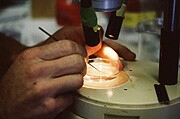 |
 |
 |

Genes Predict Chances of Breast Cancer's Spread
Finding could help docs tailor treatments even further, researchers say|
|
HealthDay
By HealthDay staff
Thursday, January 1, 2009
 THURSDAY, Jan. 1 (HealthDay News) -- In a finding that could help doctors fine-tune breast cancer treatments even further, a new study confirms that there are genes that increase the likelihood that the disease will spread throughout a woman's body.
THURSDAY, Jan. 1 (HealthDay News) -- In a finding that could help doctors fine-tune breast cancer treatments even further, a new study confirms that there are genes that increase the likelihood that the disease will spread throughout a woman's body.
Scientists from the National Cancer Institute (NCI), building upon earlier research, found in both mice and human breast tumor samples that a certain gene signature predicted the chance of metastasis. Many experts have believed that metastasis is primarily the result of non-inherited mutations in cancerous tissue.
"Our earlier studies clearly established that inherited factors also play an important role in metastatic progression and can help distinguish which tumors have a propensity to metastasize," study author Kent W. Hunter, head of the NCI's Metastasis Susceptibility Section in the Laboratory of Cancer Biology and Genetics, said in an NCI release. "Hopefully, in the future, we will be able to determine which women are more likely to have a tumor that would metastasize, and we could then tailor therapy specifically for them, avoiding the use of harsh treatments for those with a low probability of metastasis."
The researchers first discovered a gene signature in mice that raised the risk of breast cancer metastasis in mice by 20-fold. They then found the corresponding human gene signature, and it predicted relapse or recurrence in four of five breast cancer patients.
"Our study provides additional evidence of the role of inherited genes in human breast cancer progression," Hunter said.
The study was published in the Jan. 1 issue of Cancer Research.
HealthDay
Copyright (c) 2009 ScoutNews, LLC. All rights reserved.
Related News:
More News on this Date
Related MedlinePlus Pages:
| Home | Health Topics | Drugs & Supplements | Encyclopedia | Dictionary | News | Directories | Other Resources | |
| Disclaimers | Copyright | Privacy | Accessibility | Quality Guidelines U.S. National Library of Medicine, 8600 Rockville Pike, Bethesda, MD 20894 National Institutes of Health | Department of Health & Human Services |
Date last updated: 02 January 2009 |




